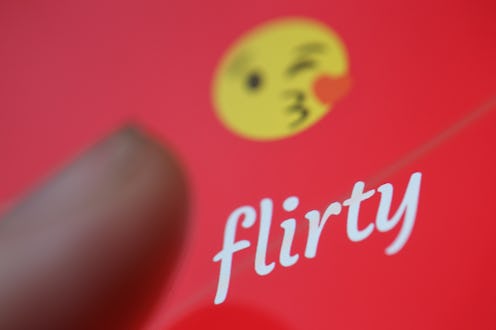Life
Is Online Dating Making Us Politically Polarized?
Moral panic alert: In an article for the Pacific Standard on online dating, Shanna Pearson-Merkowitz writes, "The increased ability to sort out potential mates according to predefined preferences may also be making the United States more politically polarized."
It was only a matter of time until someone blamed Match.com for rude bumper stickers. With every technological innovation — especially when so inherently tied to our personal lives — someone is bound to overreact on some study. Now, online dating is dangerous, because apparently dating someone who has similar political leanings is all the Internet's fault.
According to a new study published in Political Behavior, the preferences people use to choose a date online are correlated with political leanings, as Pearson-Merkowitz explains:
The study suggests there may be long-term consequences for political polarization: not only are such couples more likely to move to the ideological extremes because they lack access to contradictory opinions, they also are likely to produce children who hold ideologically extreme positions. The end result is a more polarized America where more and more people cannot understand how others could possibly think differently from themselves.
Note that this study argues that all couples choose each other based on lifestyle and other preferences that reflect deeper-set political leanings. Users of online dating services are just what researchers used as a sample for everyone in the dating world. In no part of the study did researchers examine the differences between couples who met online and those who met offline.
Pearson-Merkowitz is arguing that online dating facilitates finding people who are way too similar. "The ability to filter relationships based on factors that correlate highly with political preferences is possible only due to the advent of personal webpages, social media, and dating websites," she writes. Because online dating allows you to find matches outside your usual social circle, and possibly a larger number of potential mates you could ever meet face-to-face, Pearson-Merkowitz argues that it makes for pickier singles. But online dating doesn't actually change the dating game that much — it just takes it online.
"The Internet also allows people to be pickier about who qualifies as 'acceptable' before they ever have the chance to meet," argues Pearson-Merkowitz. Yes, online dating allows people to be pickier faster. But if you absolutely don't want to be with a Republican, you're going to end it whether you meet online or offline — it just might take a bit longer to get to know who your date votes for if you're not dealing with detailed dating profiles.
A recent study found that members of a given political party increasingly "dislike, even loathe, their opponents." Specially, views of bipartisan couples have grown more negative over the past few decades. "In 1960, about 5 percent of Americans expressed a negative reaction to party intermarriage; in 2010, about 40 percent did," write the authors.
So if we want to blame something for political polarization, maybe we should look at politics itself — research shows intense and increasing political polarization in the Senate. Mass polarization is a widespread phenomena, and it can't be traced directly to online dating. So let the hopeful singles roam the online dating world — they would probably end up with a partner from the same party anyway.
